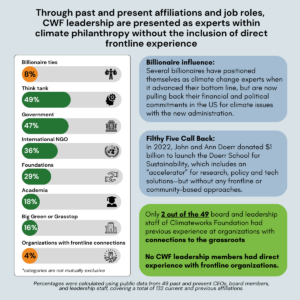
Editor’s note: This post is part of an ongoing series of posts featuring NCRP nonprofit members.
What would happen if every congregation of faith in this country had the tools to free their communities of systemic inequities? PICO National is trying to find out.
With affiliate organizations in 21 states, PICO draws from the accumulated knowledge of varying faith communities across the United States to advocate for movements dismantling systemic oppression, and pairs that advocacy with the largest independent voter engagement program working outside of political campaigns and labor.
But each affiliate also operates as an independent organization day-to-day, wielding their resources to cut down root problems in their respective cities and neighborhoods.
Lessons learned locally inform the direction of PICO’s national strategy, but they are sometimes lost in conversations with funders. Philanthropy could better serve organizations like PICO if it acknowledged that those closest to the work best know how to accomplish it.
PICO federations have racked up quite a few wins of late. Under their criminal justice reform/gun violence prevention campaign Live Free, they have targeted 15-20 counties for local level reforms including the adoption of gun-violence reduction strategies such as Ceasefire.
PICO California helped win the strongest sanctuary policy in the country, while the Minnesota affiliate (ISAIAH) took on the school-to-prison pipeline. Their economic justice campaigns have produced successful ballot measures like minimum wage increases in Massachusetts and Colorado, public transit expansion in Indianapolis and universal prekindergarten in Cincinnati.
Regressive headwinds blew PICO National into a more defensive posture this past year due to changes in direction at the federal level. Their long-sought reform to payday lending rules, developed in partnership with the Consumer Financial Protection Bureau, appears doomed with the agency’s leadership now in flux.
PICO worked to influence the Department of Justice on the so-called “ban the box” policy, which would have barred federal contractors from discriminating against returning citizens in the hiring process. This too seems unlikely to succeed.
Constant threats to the Affordable Care Act and the revoked protections for Dreamers have encumbered PICO National’s ability to aid those hurt by systems of injustice, forcing them to replay previous battles instead of fighting new ones.
Despite these setbacks, the national arm is evolving to help support its thriving state and local level federations through its “Five Levers of Change”:
- First, PICO National is helping its individual member 501(c)3s set up sister 501(c)4s to cultivate their regional electoral influence.
- Second, they have expanded their professional and leadership development programs to help fledgling executive directors – drawn largely from community organizing backgrounds – understand the minutiae of managing a nonprofit.
- Under the third lever, they are refining their own leadership, with a restructuring of the PICO National board to better represent the communities they serve.
- This should help as they expand both the locations and the means by which prospective congregations could join PICO; this fourth lever would remedy the network’s absence in non-urban areas and unlock an obscure recruitment process that over-relies on word-of-mouth.
- Concurrent with these endeavors is a deliberate push to find new funding sources. PICO has historically fundraised almost exclusively through foundations, but is now aiming to raise money from individual donors and other non-foundation entities. This fifth lever should buttress PICO National’s already agile support for its affiliates. Ideally these prospective funders would take their cue from PICO’s core set of foundations, and back the network of faith-driven movers-and-shakers with general operating support that lets those closest to the work steer its progress.
Faraway philanthropists who dictate the scope and methods of change jeopardize an affiliate’s ability to authentically organize its community.
Failing to do so would be a real shame, because the roots of organized religion in this country run deep. As they branch out into non-urban communities and sprout (c)4s to help congregations influence local politics, fully empowered PICO federations could bloom with unbound social good – think ending mass incarceration, instituting gun violence prevention, creating a pathway for citizenship for those currently without one and more.
Systemically, PICO could lead the dismantling of white supremacy and the fortification of community leadership by ensuring each affiliate has the tools to enact their communities’ envisioned change. This approach beseeches funders to take risks and forge partnerships with nascent nonprofits so they can fulfill their great promise.
PICO’s model of faith-based community organizing has yielded concrete results, so the risk lies less in the capacity of either the affiliates or the national body, and more in a grantmaker’s willingness to cede control. If they are courageous enough, funders could unleash truly transformative change.
Troy Price is NCRP’s membership and fundraising intern. Follow @NCRP on Twitter.
































































































































































































































































































































































































































